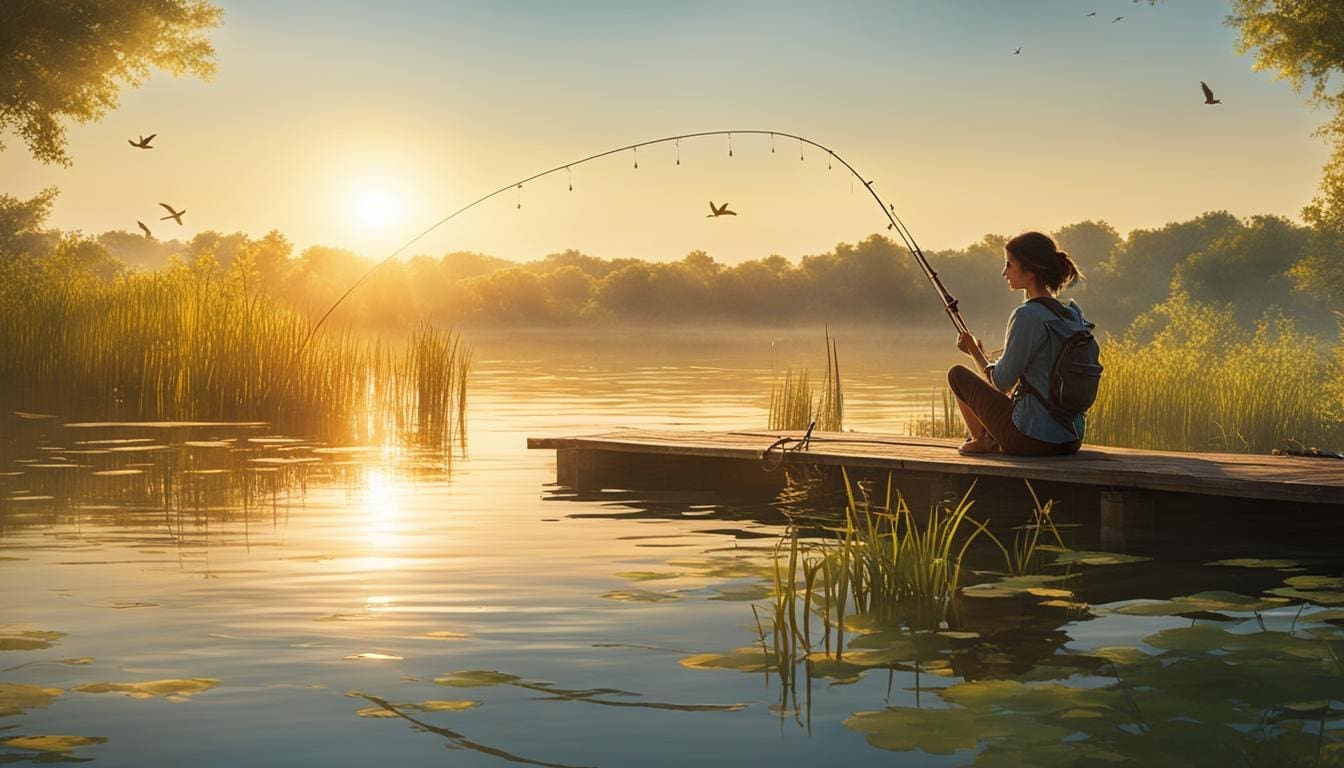Fishing is more than just a leisure activity; it is a way to connect with nature and experience the thrill of the catch. It offers relaxation, stress relief, and numerous benefits for physical and mental well-being. Whether you are a beginner or an experienced angler, fishing can provide a sense of joy and mindfulness. In this article, we will explore the joys of leisure fishing and why it is a valuable pastime for relaxation and personal growth.
Key Takeaways:
- Leisure fishing offers relaxation, stress relief, and benefits for physical and mental well-being.
- Fishing provides a sense of joy, mindfulness, and personal growth.
- Whether you are a beginner or an experienced angler, fishing can bring joy and fulfillment.
- Embracing leisure fishing allows for a deeper connection with nature and the thrill of the catch.
- Leisure fishing is a valuable pastime with numerous benefits for overall well-being.
The Thrill of the Catch and the Weight of Responsibility
Recreational and sport fishing is more than just a leisure activity; it is a pursuit that bridges our past, present, and future. With every cast, anglers have the power to influence the future of aquatic ecosystems. Responsible fishing practices, such as catch and release and respecting spawning seasons, play a crucial role in preserving fish populations. By embracing the weight of responsibility, anglers can ensure a sustainable fishing legacy for future generations.
Responsible fishing goes beyond the thrill of the catch. It requires a deep understanding of the delicate balance between humans and nature. Catch and release, for example, allows anglers to experience the excitement of reeling in a fish while also ensuring its survival. By releasing fish back into the water, anglers contribute to the conservation of fish populations and the overall health of ecosystems.
Respecting spawning seasons is another essential aspect of responsible fishing. During these critical times, fish engage in reproductive activities that are vital for the survival of their species. By avoiding fishing in these seasons, anglers give fish the opportunity to reproduce and replenish their populations. This demonstrates our commitment to being stewards of the aquatic environment and preserving fish for future generations.
The Role of Sustainable Fishing
Sustainable fishing practices are key to ensuring the long-term health and abundance of fish populations. This involves adopting techniques that minimize negative impacts on the environment and prioritize the conservation of fish species. Sustainable fishing also takes into account the overall health of aquatic ecosystems, considering factors such as habitat protection and water quality.
| Benefits of Sustainable Fishing | Examples |
|---|---|
| Preservation of fish populations | Implementing catch limits and size restrictions |
| Conservation of habitat | Protecting sensitive areas and reducing pollution |
| Minimization of bycatch | Using selective fishing gear and reducing accidental capture of non-targeted species |
| Enhancement of ecosystem resilience | Supporting restoration projects and promoting biodiversity |
By adopting sustainable fishing practices, anglers contribute to the overall balance and health of aquatic ecosystems. It is our responsibility to ensure that future generations can enjoy the same thrill of the catch that we do today.
The Principles of Responsible Recreational and Sport Fishing
Responsible recreational and sport fishing is not just about catching fish; it is about preserving and protecting our precious aquatic ecosystems. By following these principles, anglers can ensure the sustainability of fish populations and the health of their habitats.
Catch and Release
The practice of catch and release allows anglers to enjoy the thrill of the catch while ensuring the survival of fish species. By properly handling and releasing fish, we can minimize the impact on their well-being and ensure their ability to reproduce and replenish their populations. When practicing catch and release, it is important to handle fish with wet hands or gloves, use barbless hooks, and avoid keeping the fish out of the water for extended periods. This not only protects the fish but also helps maintain the balance of the ecosystem.
Respect Seasons and Species
Respecting seasons and species is crucial for maintaining healthy fish populations. Different fish species have specific spawning seasons, during which they are particularly vulnerable to disturbances. By understanding and adhering to these seasons, anglers can ensure that fish have the opportunity to reproduce and sustain their populations for future generations. Additionally, it is important to follow size and bag limits set by local regulations to avoid overfishing and to allow fish to reach their reproductive maturity.
Embrace Technology
Embracing technology can enhance our understanding of fish behavior and assist in sustainable fishing practices. Digital tools, such as species identification apps and population tracking systems, can help anglers make informed decisions about which species to target and where to find them. This knowledge enables anglers to fish responsibly, avoiding sensitive areas and minimizing the impact on fish populations and their habitats.
Leave No Trace
When engaging in recreational fishing, it is essential to leave no trace behind. This means properly disposing of trash, such as fishing lines, hooks, and any other waste, and cleaning up after ourselves. It also involves respecting natural habitats and avoiding damage to vegetation and sensitive areas. By minimizing our impact on the environment, we can ensure that future generations can continue to enjoy the beauty and abundance of our waters.
| Principle | Description |
|---|---|
| Catch and Release | Allows fish to survive and reproduce |
| Respect Seasons and Species | Protects vulnerable fish during critical periods |
| Embrace Technology | Enhances understanding of fish behavior |
| Leave No Trace | Minimizes impact on the environment |
Fishing Advocacy and Conservation Policies: Protecting our Waters for Future Generations
As passionate anglers, it is our duty to protect and preserve our waters for future generations. Through fishing advocacy and the implementation of conservation policies, we can ensure the long-term health and sustainability of our aquatic ecosystems. By actively engaging in these initiatives, we have the power to make a positive impact on the future of fishing and the preservation of our natural resources.
One vital aspect of fishing advocacy is the promotion of clean water initiatives. Clean water is crucial for the survival and well-being of fish species and their habitats. By supporting policies that aim to reduce pollution, regulate discharge, and improve water quality, we can create an environment that fosters healthy fish populations and enhances the overall fishing experience.
Habitat protection is another key component of fishing advocacy. Fish rely on specific habitats, such as rivers, lakes, and coastal areas, for spawning, feeding, and shelter. By advocating for the preservation of these habitats and supporting initiatives that prevent habitat destruction and degradation, we can ensure that fish have the necessary environments to thrive and reproduce.
“Conservation policies and fishing advocacy go hand in hand. It is through the collective efforts of anglers, policymakers, and environmental organizations that we can protect our waters and the diverse ecosystems they support.”
Conservation policies play a vital role in maintaining sustainable fishing practices. These policies establish guidelines and regulations that help manage fish populations, prevent overfishing, and ensure the long-term viability of fisheries. By actively supporting and advocating for conservation policies, we can contribute to the balance and resilience of our aquatic ecosystems, allowing future generations to enjoy the wonders of fishing.
| Advocacy Initiatives | Impact |
|---|---|
| Clean Water Initiatives | Improves water quality for fish species and protects their habitats |
| Habitat Protection | Preserves essential habitats for fish spawning, feeding, and shelter |
| Conservation Policies | Manages fish populations, prevents overfishing, and ensures sustainable fishing practices |
Fishing advocacy and the implementation of conservation policies are essential for the future of fishing. By actively participating in these initiatives, we can safeguard our waters, protect fish populations, and promote sustainable angling practices. Together, let us use our voices to advocate for change and ensure that fishing remains a cherished pastime for generations to come.
The Future of Fishing Is in Our Hands
As anglers, we have a profound responsibility to shape the future of fishing. By adopting sustainable fishing practices and prioritizing the well-being of our aquatic ecosystems, we can ensure that future generations can enjoy the same joys and wonders of fishing that we do today. It is our duty to be responsible anglers and stewards of the environment, preserving the legacy of fishing for years to come.
Preserving a Fishing Legacy
Our actions today will define the fishing legacy we leave behind. By practicing sustainable fishing techniques, such as catch and release, respecting bag limits, and using environmentally-friendly gear, we can help maintain healthy fish populations and protect their habitats. It’s important to educate ourselves on the best practices for our local waters and abide by regulations set forth by fisheries management organizations. Every fish we release, every habitat we preserve, contributes to the sustainability of fishing and ensures its future for generations to come.
Teaching Responsible Angling
Passing down the values of responsible angling to future generations is essential. By teaching our children and young anglers the importance of ethical fishing practices, we can instill in them a sense of stewardship and respect for nature. Teaching them about catch and release, conservation, and the balance between enjoyment and preservation will help create a new generation of responsible anglers who will carry the torch of sustainable fishing practices.
Advocating for Change
As passionate anglers, we have the power to advocate for change and protect our waters. By supporting organizations that promote sustainable fishing, participating in clean-up initiatives, and actively engaging in conversations about conservation, we can drive positive change in fishing policies and practices. Together, we can ensure that our fisheries are protected, habitats are preserved, and future generations can experience the wonders of fishing.
| Actions For Sustainable Fishing | Impacts on the Future of Fishing |
|---|---|
| Practicing catch and release | Preserves fish populations, ensures reproduction and growth |
| Using biodegradable fishing gear | Reduces pollution and protects marine wildlife |
| Supporting conservation organizations | Funds research, habitat restoration, and sustainable fishing initiatives |
| Engaging in clean-up efforts | Keeps our waters clean and protects ecosystems |
By taking proactive steps today, we can shape a future where fishing remains a cherished pastime for all. Let’s embrace our role as responsible anglers, advocate for change, and prioritize the health of our waters. Together, we can ensure a sustainable fishing legacy that will be enjoyed by future generations, perpetuating the joy and connection to nature that fishing provides.
The Connection between Fishing and Independence Day
The 4th of July is a day of celebration, marked by fireworks, barbecues, and gatherings with loved ones. But for many fishing enthusiasts, this holiday holds a special significance. It is an opportunity to combine the traditions and values of Independence Day with the joys of fishing. Fishing on the 4th of July allows us to connect with nature, honor our freedoms, and create lasting memories with friends and family.
Tradition and freedom go hand in hand on Independence Day, and fishing embodies these ideals. By casting our lines into the water, we embrace a timeless pastime that has been passed down through generations. The act of fishing is a symbol of self-reliance and resilience, as we rely on our skills and knowledge to catch fish and navigate the waters. It allows us to experience the freedom and independence that our great nation was built upon.
Quality time with loved ones is another important aspect of the 4th of July, and fishing provides the perfect opportunity for bonding and creating lasting memories. Whether it’s teaching a child how to cast a line, having friendly competitions to see who catches the biggest fish, or simply enjoying the peace and serenity of nature together, fishing allows us to strengthen our relationships and make the most of this special day.
Connecting with nature is an essential part of the 4th of July experience, and fishing provides a direct connection to the outdoors. As we sit by the water’s edge, surrounded by the beauty of nature, we can appreciate the wonders of our natural environment. Fishing allows us to escape the hustle and bustle of everyday life and find solace in the tranquility of nature. It is a way to recharge, reset, and reconnect with the world around us.

Fishing and Family Traditions
In many families, fishing on the 4th of July has become a cherished tradition. Generations gather together, sharing stories, laughter, and the thrill of the catch. These traditions not only create lasting memories but also pass on values such as patience, perseverance, and respect for nature. Fishing on Independence Day allows us to honor our heritage while building a legacy for future generations.
| Benefits of 4th of July Fishing | |
|---|---|
| 1. Connection to nature and the outdoors | 2. Quality time with loved ones |
| 3. Embracing tradition and freedom | 4. Creating lasting memories |
Celebrating Americana through Fishing
Fishing is deeply ingrained in American culture, symbolizing the values of self-reliance, resilience, and exploration. It is a time-honored activity that allows individuals to connect with nature and experience the beauty of fishing in American waters. From pristine lakes to roaring rivers and bountiful coastlines, anglers have the opportunity to explore the diverse aquatic landscapes that make up the great American outdoors.
Engaging in fishing fosters a sense of self-reliance, as anglers rely on their skills and knowledge to navigate the waters, select the right bait, and reel in their catch. It is a testament to the pioneering spirit and determination that define America. Furthermore, fishing exemplifies resilience, as anglers face challenges such as changing weather conditions, elusive fish, and unexpected obstacles. The ability to adapt to these circumstances and persevere reflects the indomitable spirit of the American people.
Fishing is not just a leisure activity; it is a cultural heritage that connects individuals to the principles and values of the nation.
Americans have a deep respect for the land and waters that provide abundant fishing opportunities. It is a reflection of the strong bond between Americans and the natural world. Fishing not only offers a way to explore and appreciate the beauty of nature but also serves as a reminder of the importance of preserving and protecting these precious resources for future generations.
Table: The Connection Between Fishing and American Values
| Value | Description |
|---|---|
| Self-Reliance | Fishing requires individuals to rely on their skills and knowledge to navigate and succeed on the waters. |
| Resilience | Fishermen face challenges and setbacks but persevere with determination and adaptability. |
| Exploration | America offers a vast range of fishing experiences, from lakes and rivers to coastlines and deep-sea adventures. |
| Preservation | Fishing reminds us of the importance of preserving and protecting our natural resources for future generations. |
By celebrating fishing as a patriotic activity, Americans not only honor their heritage but also contribute to the conservation and sustainability of the country’s aquatic ecosystems. The connection between fishing and American pride runs deep, encompassing the values that have shaped the nation throughout its history. It serves as a reminder of the strength and resilience that define America and the responsibility to be good stewards of the land and waters.
In conclusion, fishing is more than just a pastime; it is an expression of American pride that embodies the spirit of self-reliance, resilience, and exploration. As anglers cast their lines into American waters, they connect with the values and principles that have shaped the nation. By embracing fishing as a patriotic activity and advocating for the preservation of our natural resources, we ensure that future generations can continue to enjoy the beauty and bounty of fishing in American waters.
Conclusion
Fishing is not just a leisure activity; it is a responsibility that extends to future generations. By practicing responsible fishing, advocating for change, and prioritizing the health of our waters, we can create a fishing legacy that ensures bountiful and healthy ecosystems for years to come.
Our fishing legacy is not just about the fish we catch today, but about the future of fishing for our children and grandchildren. It is our duty to pass down a tradition that is sustainable and respectful of nature. By adopting sustainable fishing practices, such as catch and release, respecting seasons and species, and embracing technology, we can make a positive impact on fish populations and their habitats.
As anglers, we have the power to shape the future of fishing. By teaching future generations the importance of responsible fishing and advocating for conservation policies, we can ensure that our waters remain healthy and thriving. Let us embrace the joys of leisure fishing while keeping in mind our duty to protect and preserve our natural resources. Together, we can create a fishing legacy that will be cherished by future generations.

